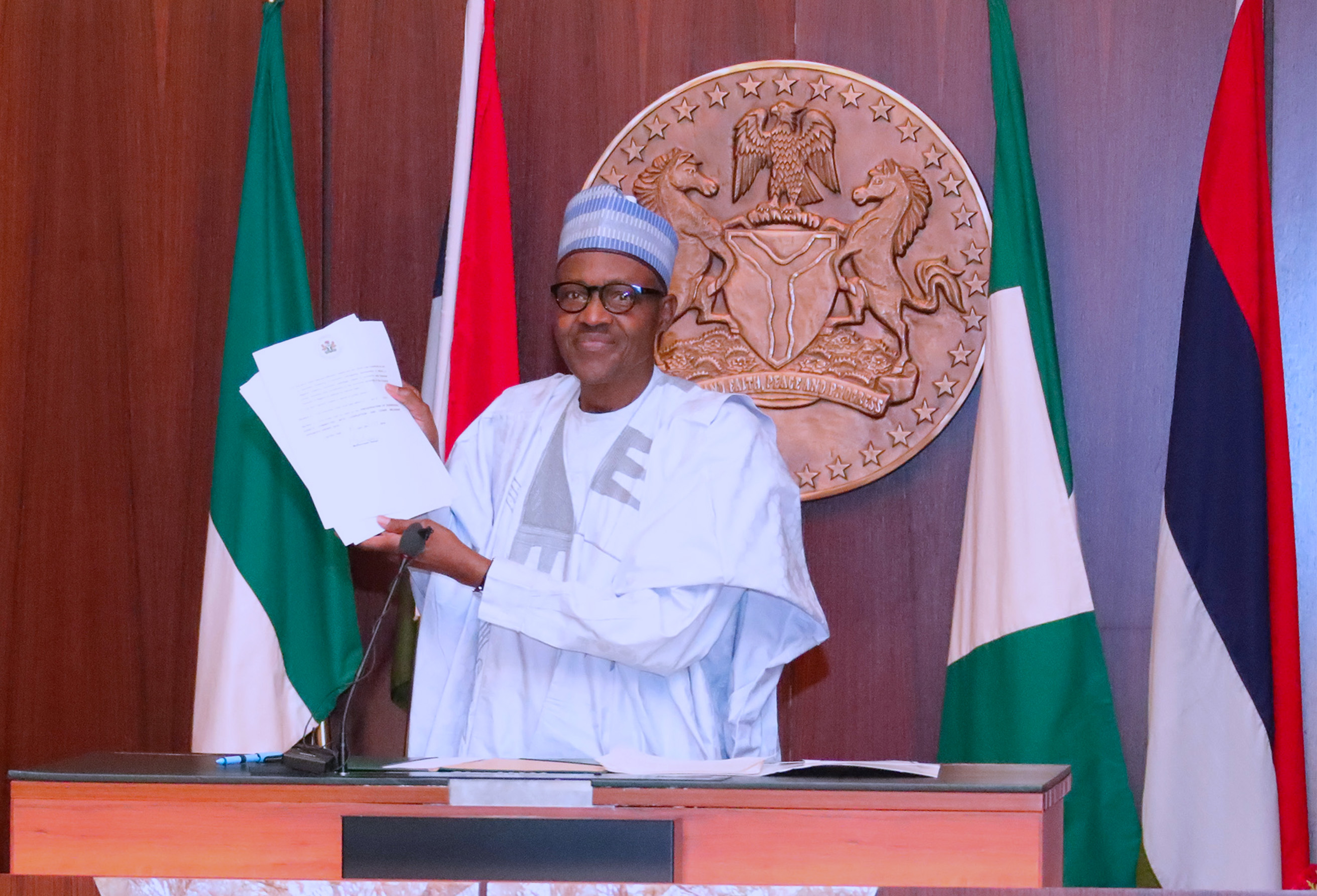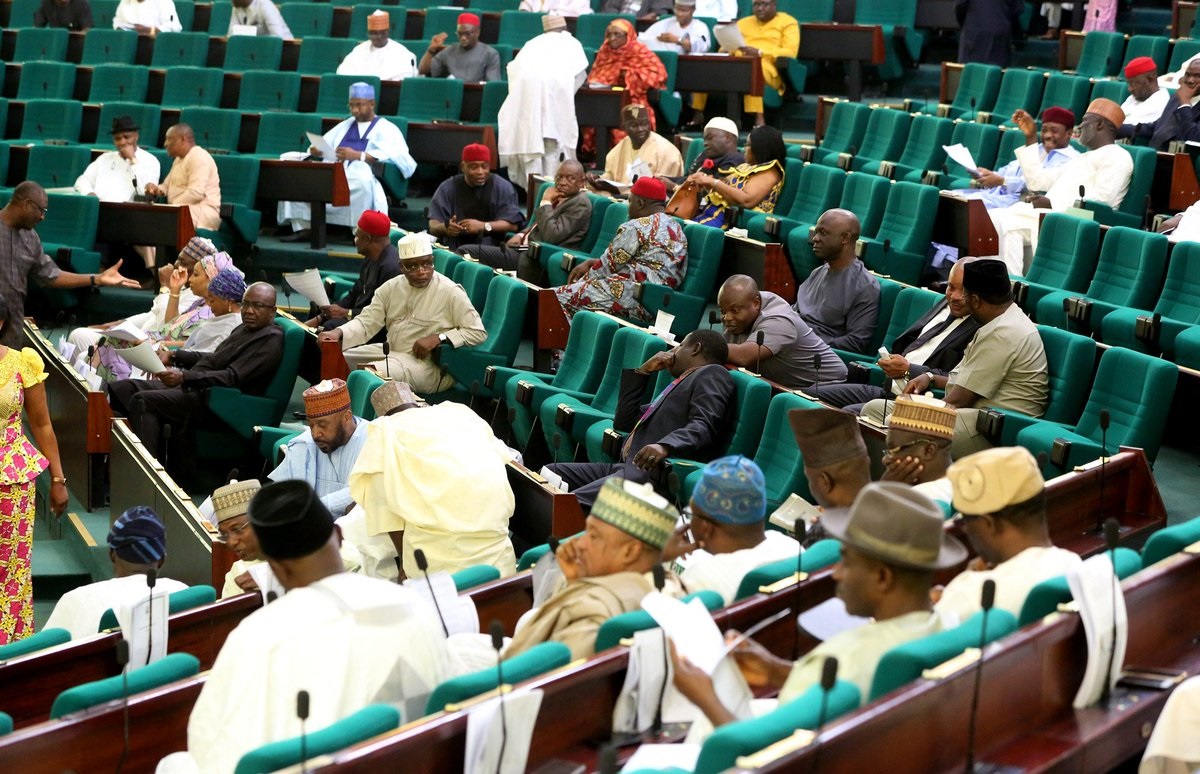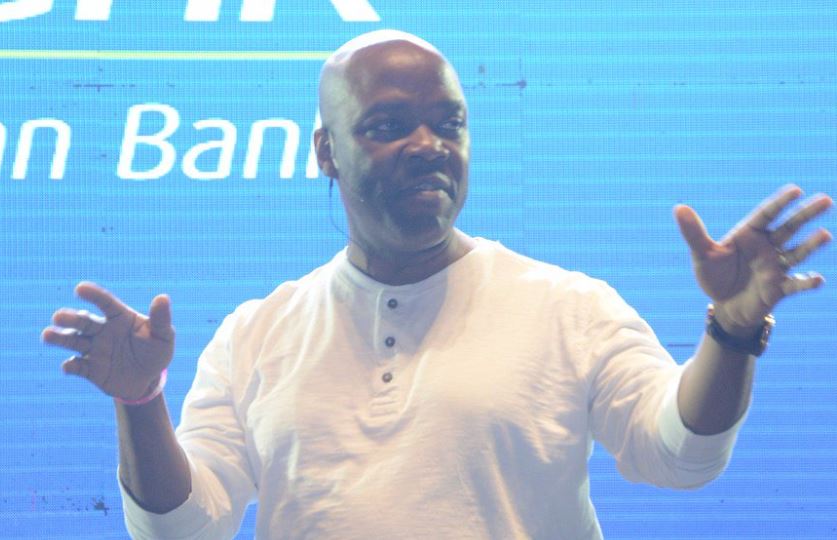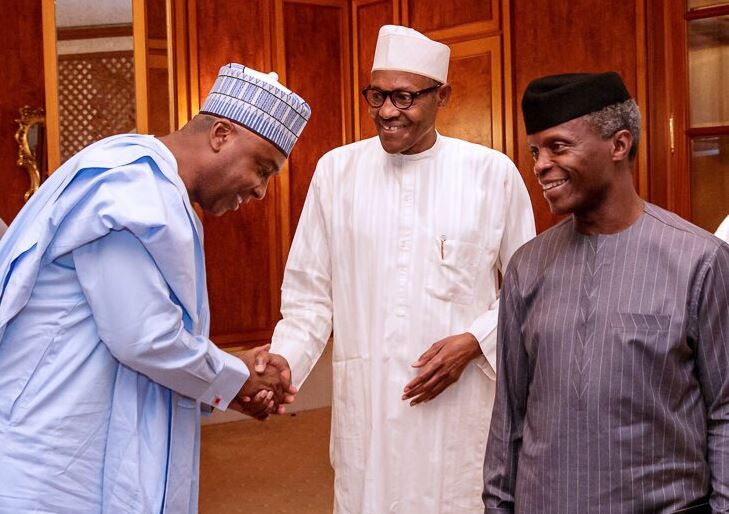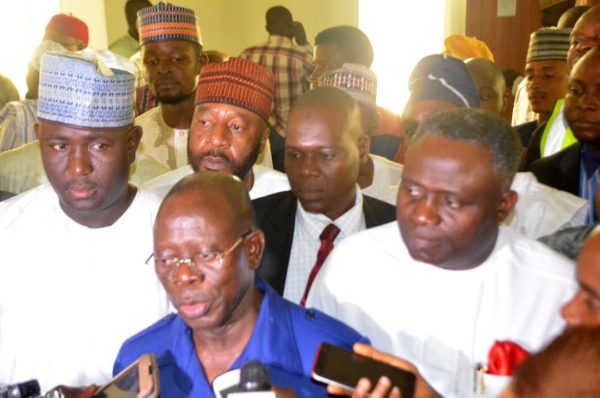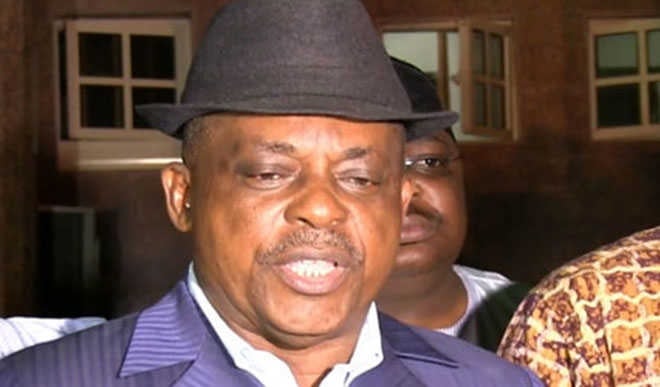PRESIDENT BUHARI SIGNS EXECUTIVE ORDER 6 PIC 2B. President Muhammadu Buhari signs into Law Executive Order 6 on the Preservation of Suspicious Assets Connected with Corruption held at the Council Chambers State House, Abuja. PHOTO; SUNDAY AGHAEZE. JULY 5 2018.
BY ABIODUN AIKOMO
In line with the manifesto of the ruling APC, President Muhammadu Buhari has since assuming Office in May 2015 been committed to the fight against corruption as one of the major policies of his administration.On 5th July 2018, the President issued Executive Order No. 6 on the Preservation of Suspicious Assets Connected with Corruption (“PEO”) in furtherance of the Government’s anti-corruption agenda. The PEO is essentially a Policy directive to agencies of the Federal Government to synergize the implementation of the vast powers vested in the President under Section 5 of the Constitution of the Federal Republic of Nigeria (as amended) particularly as it relates to the fight against corruption.
Our attention has been drawn to a number of reactions raising issues as to the legality or otherwise of the PEO. It was argued inter alia that the PEO is a draconian attempt to usurp the judiciary’s power of interpretation; constitutes aninfraction of the Constitution; violates the doctrine of separation of powers; etc. It has thus become necessary to clarify the foregoing issues to the general public so that the good intention of Mr. President in issuing the PEO is not misconstrued.
In a Constitutional Democracy like ours, the primary role of the Executive arm which is the energizing force of the Government is to set priorities, mobilize support, react to problems, resolve crisis, make decisions and oversee the implementation or execution of such decisions. Often times, any or all of the foregoing Executive roles could be implemented via Executive Orders. Thus, an Executive Order is a legally binding order given by the President to guide and direct the execution of Laws or Policies. Section 5 of the Constitution of the Federal Republic of Nigeria, 1999 (as amended) vests the President with power to execute and maintain the Constitution and all other Laws in force within the Federal Republic of Nigeria including but not limited to Acts of the National Assembly enacted for the purpose of curbing corrupt practices such as Sections 26, 28, 29 and 30 of EFCC Act, Section 37, and 44-49 of the Corrupt Practice and Other Related Offences Act, Section 33 of NDLEA Act, Section 167 of the Customs and Excise Management Act, and Section 52(2) of the Trafficking in Persons Law Enforcement and Administration Act)–theseActs of the National Assembly, and more, concur with the spirit and intent of Sections15(5), 44(2) (k), 45(1), 315 and 11(3) of the Fifth Schedule (Part 1) of the 1999 Constitution of the Federal Republic of Nigeria as amended. The foregoing Constitutional and Statutory provisions provide the legal basis for the PEO and it must also be highlighted that the validity or otherwise of any Presidential Executive Order must be determined by its compliance with the Constitution.
Advertisement
Onemphasizing the consequences of corrupt practices in the preamble to the PEO, the fact that corruption affects every aspect of our existence as a Nation cannot be over emphasized. Some critics have objected to its inclusion and described it as “stating the obvious.”With due respect, this objection is in our view, unnecessary as it is tantamount to questioning the inclusion of preambles in any other Legislation or Executive Order. For what it is worth, a preamble is an introductory statement in a legislation that explains its purpose and underlying philosophy. For the sake of emphasis, the PEO seeks to preserve suspected illicitly acquired assets from dissipation, and from being available for usage inimical to the fight against-corruption.Hence, the need for this preamble the inclusion of which is also in accordance with the layout and structure of a standard Executive Order since it is legally enforceable and carries the weight of the law. It was therefore timely for the President to seek to invigorate the fight against corruption considering its harsh effect on Nigeria and its wealth.
Under the PEO, the scope of Corruption is stated to include activity involving matters of corruption generally as may be defined under any enactment, economic sabotage, human trafficking, drug trafficking and terrorism involving funds.This wide definition is due to the increased global awareness on the need to trace, seize and confiscate proceeds or instrumentalities used in perpetrating these crimes to serve both restitution and deterrence purposes. For instance, all funds emanating from crimes such as kidnapping, terrorism financing are regarded as proceeds of crimeunder the Trafficking in Persons Prohibition and Prevention Enforcement Act 2015 and Terrorism Prevention Act 2013 respectively.
On whether the PEO usurps the power of the Judiciary to determine who is complicit in corrupt practices, Section 1(a)of the PEO states that : ‘‘Without prejudice to any laws or existing suits or any other rights arising out of or in respect thereof, all assets of any Nigerian citizen… any person who is responsible for or complicit in, or has directly or indirectly engaged in Corrupt Practices and Other Related Offences are forthwith to be protected from dissipation by employing all available lawful or statutory means, including seeking the appropriate Order(s) of Court where necessary,and shall not be transferred, withdrawn or dealt with in any way until the final determination of any corruption related matter against such a person(Italics and underline for emphasis). It is clearly stated that preservation of assets shall be done through lawful means including appropriate Orders of the Court. The above is to the effect that assets of any person subject to corruption related investigation or litigation shall not be transferred, withdrawn or dealt with in any way until the final determination of any corruption related matter against such person. From the foregoing express provision of the PEO, it is beyond doubt that relevant assets can only be protected strictly through recourse to a Court of competent jurisdiction. The PEO has therefore not passed ExecutiveJudgement on any person as it is being insinuated or at all and is also not an attempt to usurp the Judiciary’s primary role of statutory interpretation.
Advertisement
The First Schedule to the PEO listed on-going Prosecutions and directed that the assets involved should be immediately preserved through lawful means which includes seeking appropriate Court Orders as may be necessary. It must be further emphasized that the obligation to ensure preservation of relevant assets in furtherance of their respective statutory duties is directed at the Enforcement Agencies listed in Second Schedule to the PEO under the general supervision of the Attorney General of the Federation. Thus, any insinuation that the clear and unambiguous provisions of the PEO constitute Presidential directiveto Judges on what to do is lacking in objectivity.A community reading of Sections 1(c), 3, 4 and 5(c) of the PEO show without any iota of doubt that the Enforcement Agencies have aduty of ensuring preservation of illicitly acquired assets by seeking and obtaining necessary orders of the Court. Therefore, by issuing the PEO, Mr. President has only given a definite policy direction to the relevant Enforcement Agencies on how to proceed with implementation of theirrespective Statutes which provide for freezing of assets. This is the traditional and Constitutional role of the Executive arm of government.
With regard to the duties of the Attorney General of the Federation and Minister of Justice (HAGF)under the PEO as specifically provided in the Section1 (b)(c) and 4thereof, it must be stated that the power of the HAGF isnot inultra vires the Constitutional power vested in the Office of the HAGF under Section 174 of the Constitution of the Federal Republic of Nigeria, or in contravention of any known statutory provision(s). It is also not an attempt to by-pass theJudiciary.There is a connection between the Constitutional Powers of HAGF over all prosecutions in Nigeria under the Constitution and the powers of other statutory entities imbued with Prosecutorial powers. This underscores the need for coordination among these prosecuting agencies and the Office of the Attorney General of the Federation. Instances can be drawn from the traditional role of the Director of Public Prosecutions (in the Office of the Attorney General) who provides legal advice to the Nigerian Police and other MDAs on criminal matters and letters repertories on extradition. It must also be noted that the HAGF being a beacon of Justice can be given responsibilities under any Act of the National Assembly in fulfilment of his Constitutional duties.For instance, Section 43 of the Economic and Financial Crimes Commission Act empowers the HAGF to make Rules or Regulations with respect to the exercise of the duties, powers and functions of EFCC its establishment Act. Also, corruption cases can be prosecuted in the name of the HAGF under the Corrupt Practices and Other Related Offences Act.Assuming without conceding that the coordinating function of the HAGF as stated in the PEO is not expressly contained in some of the relevant Statutes, it must be noted that the President in his primary Constitutional role of implementation of Laws can via an Executive Order direct implementation of statutory functions where such directives do not violate nor offend the Constitution and any of the relevant Statutes.
The President can pursuant to Section 315 of the Constitution even modify any existing law as may be necessary to bring it into conformity with the provisions of the Constitution. In AG Abia V AG Federation [2003] 4 NWLR (Part 809) pages 124 at 177 paragraph F, the Supreme Court stated that the two tests for determining Constitutionality of modification to an existing law are whether: (a) the modification order brings the relevant Act into conformity with the provisions of the Constitution; and (b) there has been an infraction of the Constitution by the Order. Therefore, the directive of Mr. President under the PEO that the HAGF shouldcoordinate and oversee the activities of other agencies with prosecutorial powers is not and cannot amount to a violation of the Constitution or any other Statute governing the functions, powers and duties of these agencies.
It must be emphatically noted that Executive Orders carry the force of law. Duties and obligations have been stated under the Executive Order it is therefore a necessary consequence forsanctions to be imposed on any person who refuses to comply with same. While Laws/Actsrequire passage by the Legislative arm and assent by the President,Executive Orders are issued by the President and have influence over the internal affairs of the Executive arm of government,deciding how and to what degree legislation will be enforced in dealings with emergencies.It can only be set aside if proven in Court to be whimsical and capricious. The exact wordings of the PEO as specifically directed to certain heads of enforcement agencies is that they: ‘’shall forthwith be subject to the disciplinary procedure in accordance with Public Service Rules and investigation by the Code of Conduct Bureau.’’ This is Constitutional, and in line with best practices the world over.
Advertisement
In conclusion, the general public should please note that there is no turf war in governance and the three arms of government do not co-exist at dagger’s drawn seeking to undo or outdo one another. Notwithstanding the clear cut responsibilities of each arm of government, there is bound to be overlap as the arms of government exist to serve the State and are all aimed at achieving good governance. The United States of America which remains the leader of the Free-World, notwithstanding its century-long constitutionalism and existence of long-established functional and effective governmental institutions, successive American Presidents have used Executive Orders more than any other nation of the world. There is nothing unconstitutional about the PEO and we should not allow any form of mischief to take away the inherent benefits of this pro-active policy directive of the President on the fight against corruption.
Subjective opinions and arguments advanced by any group or individuals cannot determine the validity or otherwise of the PEO or indeed any policy of the government. It is expected that anyone who is aggrieved should approach the Court of Law to determine the validity or otherwise of the PEO. From judicial precedent, when the Court is called upon to determine the validity or otherwise of an Executive Order, the Court cannot usurp the Power of the President to make such Order in the course of performing the traditional Executive Role of Implementation of Laws. In Ohaji v Umamka [2011] 4NWLR (Pt 11236) at page 148 the Supreme Court held that where there is a statutory provision for making an Order andwhere the making of same is reposed in the President of the Republic or Governor of a State, such function cannot be usurped by the Court.
The Administration of President Buhari will remain committed to its anti-corruption agenda, and together we shall win the war against corruption.
God bless the Federal Republic of Nigeria.
Advertisement
Aikomo is special assistant to the president on financial crimes in the office of the attorney-general of the federation and minister of justice
Advertisement
